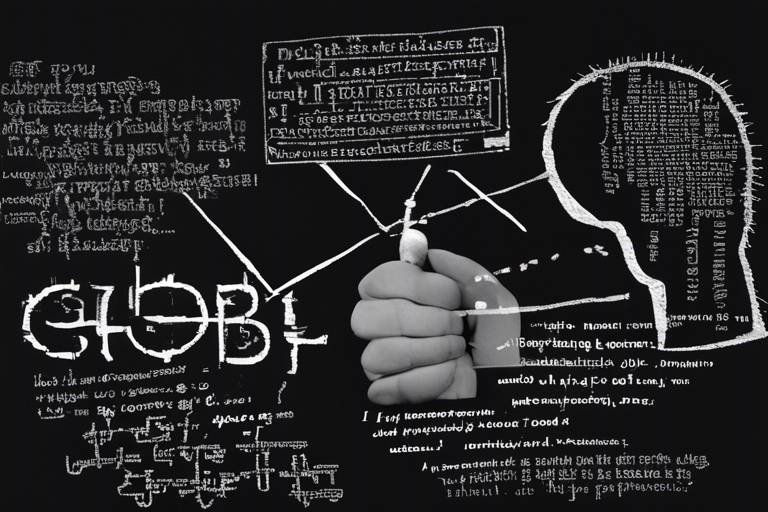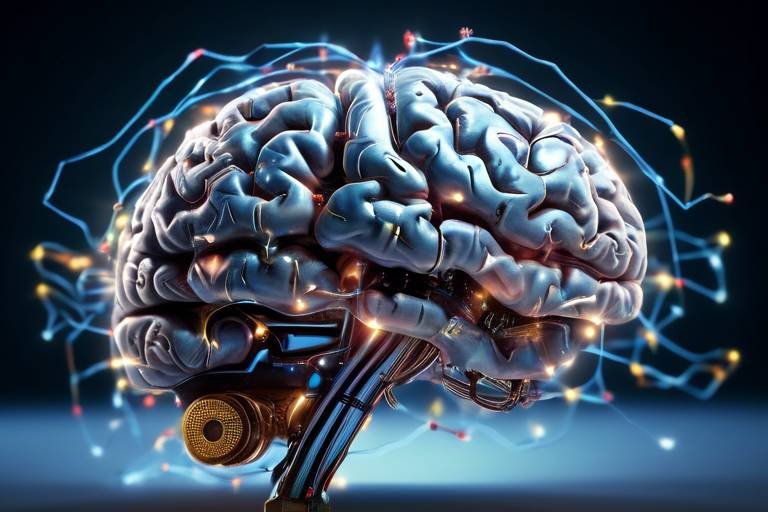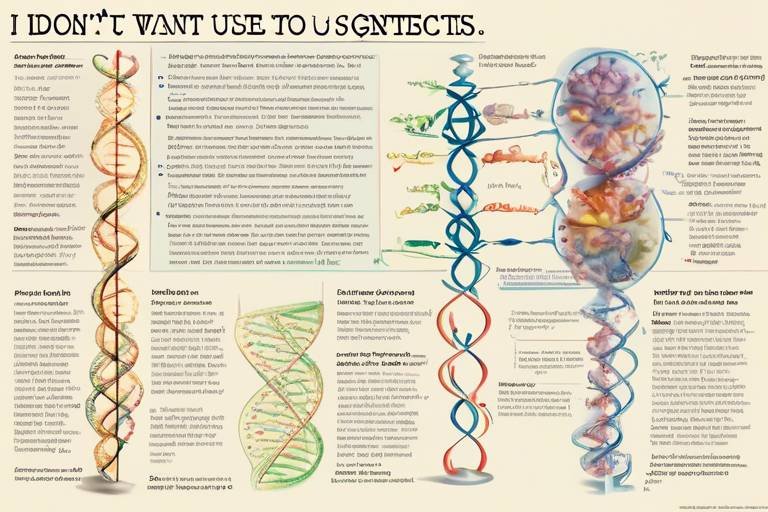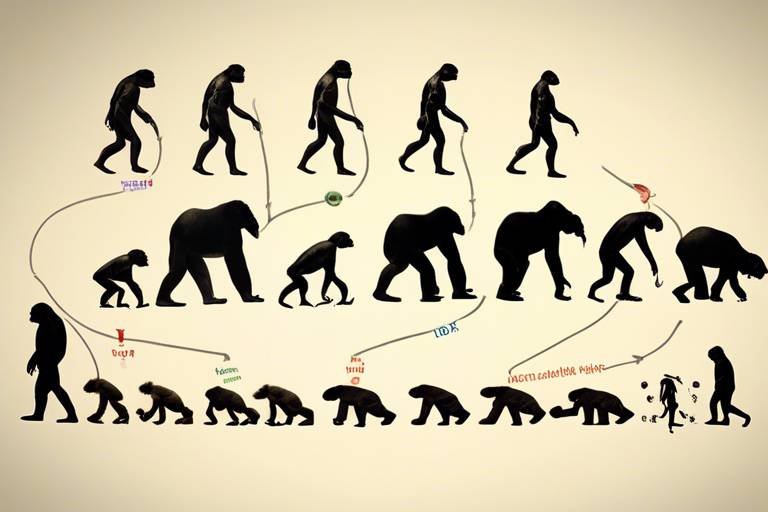Philosophy and Computer Programming - Do They Intersect?
When we think about philosophy, images of ancient thinkers and complex theories often come to mind. But what if I told you that these profound ideas have a significant role in the realm of computer programming? Yes, you heard that right! The intersection between these two fields is not just a mere coincidence; it’s a fascinating exploration of how our understanding of existence, ethics, and logic can shape the way we write code.
At its core, programming is about problem-solving. It’s about creating solutions that are not only effective but also ethical. This is where philosophy steps in, providing a framework for thinking critically about the implications of our technological creations. Imagine programming as a vast ocean, and philosophy as the navigational tools that help us steer our ship through the waters of ethical dilemmas, logic, and innovation.
In many ways, programming can be seen as a modern form of philosophical inquiry. Just as philosophers ponder deep questions about life and existence, programmers grapple with questions about how their code affects users and society. For instance, when developing a new app, a programmer might ask, “How does this technology impact user privacy?” or “Am I creating something that could potentially harm someone?” These questions are not just technical; they are deeply philosophical.
Moreover, philosophical concepts such as ethics and logic are integral to programming. The ethical implications of software development cannot be overstated. As we create increasingly advanced technologies, we must consider the responsibilities that come with them. This is not just about following a set of rules; it’s about understanding the broader impact of our work. In the following sections, we will delve deeper into how these philosophical ideas manifest in programming practices and the ethical considerations that programmers face daily.
So, are you ready to explore this intriguing relationship? Let’s dive deeper into the foundations of philosophy in programming and uncover how these two seemingly disparate fields are more connected than we ever imagined!
- How does philosophy influence programming? Philosophy encourages critical thinking and ethical considerations, which are crucial in software development.
- What ethical dilemmas do programmers face? Programmers often grapple with issues like data privacy, user consent, and the societal impact of their technologies.
- Can programming be considered a philosophical inquiry? Yes, programming involves deep questions about the implications and responsibilities of technological creations.

The Foundations of Philosophy in Programming
Understanding the philosophical underpinnings of programming can significantly enhance our approach to software development. Just like a sturdy foundation supports a grand building, philosophy provides the essential groundwork for effective programming practices. At its core, programming is not just about writing lines of code; it’s about solving problems, and philosophy encourages us to think deeply about these problems. It invites us to ask questions like, "What is the best way to solve this issue?" or "What are the potential implications of this solution?"
One of the primary philosophical concepts that can influence programming is critical thinking. This skill is crucial for developers as it allows them to evaluate the effectiveness of their code and the logic behind their algorithms. When programmers engage in critical thinking, they are more likely to identify flaws in their logic, find innovative solutions, and ultimately create more robust software. It’s like being a detective, piecing together clues to solve a complex mystery—only in this case, the mystery is how to make software work flawlessly.
Moreover, philosophy encourages a deeper problem-solving strategy. For instance, when faced with a challenging coding problem, a programmer can benefit from employing philosophical reasoning to break down the issue into smaller, manageable parts. This method mirrors the philosophical practice of analytical thinking, where complex ideas are dissected and examined closely. By applying this approach, programmers can navigate through intricate problems with greater ease and clarity.
Another important aspect is the concept of abstraction, which is prevalent in both philosophy and programming. Just as philosophers abstract complex ideas to understand them better, programmers use abstraction to simplify code. This allows them to focus on the essential features of a program without getting bogged down by unnecessary details. For example, when creating a software application, a programmer might abstract the data handling process to focus on the user interface, ensuring a smoother user experience.
Furthermore, the intersection of philosophy and programming can lead to innovative thinking. Philosophical inquiry encourages us to challenge the status quo and question existing paradigms. This mindset is invaluable in programming, where innovation drives progress. By fostering a culture of questioning and exploration, programmers can develop creative solutions that not only meet user needs but also push the boundaries of what technology can achieve.
In conclusion, the foundations of philosophy in programming are not just theoretical musings; they are practical tools that can enhance our coding practices. By embracing critical thinking, analytical reasoning, abstraction, and innovative questioning, programmers can elevate their work to new heights. The next time you sit down to write code, consider how philosophical concepts can guide your thought process, paving the way for more effective and meaningful software development.

Ethics in Software Development
In today's rapidly evolving digital landscape, the ethical implications of software development have become a focal point for programmers and companies alike. As we craft lines of code that can potentially impact millions of lives, the question arises: What moral responsibilities do we bear? The decisions made during the development process can have profound effects on privacy, security, and societal norms. It's not just about creating functional software; it's about ensuring that our creations align with ethical standards that prioritize user welfare and societal good.
When we think about ethics in software development, several key considerations come to the forefront:
- Data Privacy: In an age where information is power, safeguarding user data is paramount. Programmers must ensure that their applications comply with regulations like GDPR and respect user consent.
- User Consent: Transparency is crucial. Users should be informed about how their data is used and have the option to opt-in or opt-out of data collection practices.
- Societal Impact: The technologies we create can shape social interactions, influence behaviors, and even affect mental health. Developers must consider how their work contributes to or detracts from societal well-being.
To navigate these ethical waters, programmers can draw upon various philosophical theories that provide frameworks for decision-making. For example, utilitarianism encourages developers to consider the greatest good for the greatest number, while deontological ethics emphasizes the importance of adhering to moral duties and principles, regardless of the outcome. These lenses can guide software engineers in making choices that not only fulfill functional requirements but also uphold ethical standards.
Moreover, the role of responsibility in software development cannot be overstated. Programmers are often the unsung heroes, wielding the power to create technologies that can either uplift or harm. It's essential for developers to reflect on their responsibilities—ensuring that their code promotes positive outcomes and actively works to minimize potential harm to users and society. This sense of accountability is not just a personal ethos; it should be embedded in the culture of software development teams.
Real-world case studies provide valuable insights into the consequences of ethical decision-making (or lack thereof) in programming. For instance, consider the infamous data breach incidents that have plagued several major companies. When developers overlook security protocols, the results can be devastating, leading to loss of trust, financial repercussions, and even legal consequences. By analyzing such scenarios, we can better understand the critical importance of integrating ethical considerations into the software development lifecycle.
In conclusion, the intersection of ethics and software development is a complex yet essential topic. As technology continues to advance, the need for ethical frameworks in programming will only grow more pressing. By fostering a culture of ethical awareness and responsibility, we can ensure that our creations not only serve their intended purpose but also contribute positively to society.
Q1: Why is ethics important in software development?
Ethics is crucial because software can significantly impact user privacy, security, and societal norms. Developers have a responsibility to create technology that respects users and promotes societal well-being.
Q2: What are some common ethical dilemmas faced by programmers?
Common ethical dilemmas include issues related to data privacy, user consent, and the societal impact of technology. Programmers must navigate these challenges thoughtfully to ensure ethical outcomes.
Q3: How can developers ensure they are making ethical decisions?
Developers can refer to ethical frameworks like utilitarianism and deontology, engage in discussions about ethical practices within their teams, and prioritize transparency and user welfare in their work.

Philosophical Theories in Programming Ethics
When we think about programming ethics, it’s essential to dive into the philosophical theories that can guide our decision-making. Programming isn't just about writing code; it's about making choices that can have profound implications on society. Two major philosophical theories that often come into play are utilitarianism and deontology. Each of these theories offers a unique lens through which programmers can evaluate their work and its impact.
Utilitarianism is the idea that the best action is the one that maximizes overall happiness or utility. In the context of programming, this means that programmers should strive to create software that benefits the greatest number of people. For instance, when developing a new app, a utilitarian approach would encourage developers to consider how their product can improve the lives of users, solve significant problems, and avoid causing harm. However, this raises questions: What happens when the needs of the majority conflict with the rights of the minority? Can we justify sacrificing the well-being of a few for the happiness of many? These are crucial considerations that every programmer must ponder.
On the other hand, deontology focuses on the morality of actions themselves rather than their consequences. This theory posits that certain actions are inherently right or wrong, regardless of the outcomes they produce. For programmers, this could mean adhering to principles such as data privacy and user consent as non-negotiable ethics. Imagine a scenario where a developer is tempted to collect user data without consent for the sake of improving their product's functionality. A deontological perspective would argue that this is wrong, regardless of the potential benefits that could arise from such actions. It emphasizes the importance of respecting individual rights and maintaining integrity in the development process.
To further illustrate how these philosophical theories can be applied, let’s consider a few practical examples:
| Scenario | Utilitarian Approach | Deontological Approach |
|---|---|---|
| Data Collection | Collect data to enhance user experience for most users. | Always obtain user consent before collecting any data. |
| Algorithm Bias | Adjust algorithms to serve the majority, even if it disadvantages some. | Ensure fairness and transparency in algorithms regardless of the majority's benefit. |
| Software Accessibility | Develop features that cater to the largest user base. | Make software accessible to all users, regardless of their abilities. |
As we navigate the complex world of programming, it’s vital to recognize that these philosophical theories are not mutually exclusive. In fact, they can complement each other. A balanced approach might involve using utilitarian principles to gauge the potential impact of a project while also adhering to deontological ethics to ensure that the rights of individuals are safeguarded. This intersection of philosophy and programming ethics encourages a more holistic view of software development, where the focus isn't solely on functionality but also on the broader implications of our work.
Ultimately, as programmers, we have a responsibility to engage with these philosophical ideas. They not only shape our ethical frameworks but also influence the way we design and implement technology in our society. By understanding and applying these theories, we can create software that is not only effective but also ethical and responsible.
- What is the importance of ethics in programming? Ethics in programming ensures that technology is developed responsibly, considering its impact on users and society.
- How can philosophical theories guide programming decisions? Philosophical theories provide frameworks for evaluating the moral implications of programming choices, helping developers make informed decisions.
- Can utilitarianism and deontology coexist in programming? Yes, a balanced approach can incorporate both theories, allowing developers to consider both the consequences of their actions and the rights of individuals.

The Role of Responsibility
In the world of programming, the notion of responsibility extends far beyond the lines of code we write. It encompasses a profound obligation to consider the broader implications of our work. Programmers are often seen as the architects of the digital realm, and with this title comes the weight of responsibility to ensure that our creations do not just function effectively but also contribute positively to society. Just imagine a world where every programmer acted with the same level of care and consideration as a doctor would when prescribing medication. Wouldn’t that lead to a healthier digital ecosystem?
One of the primary responsibilities of a programmer is to ensure that their code is not only efficient but also ethical. This means being vigilant about issues like data privacy, user consent, and the potential for misuse of technology. For instance, when developing applications that handle sensitive information, programmers must implement robust security measures to safeguard user data. This is akin to a bank ensuring that its vaults are secure; the responsibility to protect user information is paramount.
Moreover, programmers must also consider the potential consequences of their work. A simple line of code can have far-reaching effects, impacting thousands or even millions of users. This is where ethical frameworks come into play, guiding programmers to make decisions that prioritize user welfare. Below are some key aspects of responsibility that every programmer should embrace:
- Transparency: Being open about how data is collected and used fosters trust with users.
- Accountability: Acknowledging mistakes and taking steps to rectify them is crucial for maintaining integrity.
- Inclusivity: Designing software that is accessible to all, including those with disabilities, reflects a commitment to social responsibility.
Furthermore, the role of a programmer also involves a commitment to continuous learning and adaptation. As technology evolves, so too do the ethical considerations surrounding it. Staying informed about the latest developments in technology and their societal impacts is essential. For example, the rise of artificial intelligence has introduced new ethical dilemmas that programmers must navigate carefully. By engaging with philosophical discussions around these topics, programmers can better understand their responsibilities in shaping the future of technology.
In conclusion, the role of responsibility in programming is not just about writing code; it's about being a conscientious member of society. Programmers have the unique ability to influence how technology interacts with our lives. By embracing this responsibility, they can help ensure that the digital world is a safe, ethical, and inclusive space for everyone. So, the next time you sit down to code, ask yourself: How does my work impact others? This simple question can lead to profound changes in how we approach software development.
- What is the primary responsibility of a programmer?
Programmers are responsible for writing code that is not only functional but also ethical, considering the implications of their work on users and society. - How can programmers ensure data privacy?
By implementing robust security measures, being transparent about data use, and adhering to legal regulations regarding data protection. - What ethical frameworks should programmers consider?
Frameworks such as utilitarianism and deontology can guide ethical decision-making by focusing on the outcomes of actions and the duties owed to users, respectively.

Case Studies in Ethical Dilemmas
The world of programming is not just about writing lines of code; it's also deeply intertwined with ethical considerations that can have profound impacts on society. Let's delve into some compelling case studies that showcase ethical dilemmas faced by programmers and the consequences of their decisions.
One notable example is the Cambridge Analytica scandal, where data from millions of Facebook users was harvested without consent to influence voter behavior during the 2016 U.S. presidential election. This case raised significant ethical questions about data privacy and user consent, illustrating how programmers must navigate the murky waters of ethical responsibility. The programmers involved had to consider not only the technical feasibility of their actions but also the potential ramifications on democracy and individual privacy.
Another striking case is the development of autonomous vehicles. Imagine a self-driving car that must make a split-second decision in a potential accident scenario. Should it prioritize the safety of its passengers over pedestrians? This dilemma echoes the classic philosophical question known as the trolley problem. Programmers working on these systems are faced with the daunting task of encoding moral decisions into algorithms, which can lead to significant ethical implications. The decisions made in the code can mean the difference between life and death, making it crucial for developers to engage in philosophical thinking about their responsibilities.
Furthermore, the FaceApp controversy serves as a modern example of ethical dilemmas in programming. The app gained popularity for its ability to alter users' photos to show them as older versions of themselves. However, it raised serious concerns regarding data usage and privacy. Users were not fully aware of how their images were being processed and stored, leading to questions about informed consent. This scenario illustrates the importance of transparency in software development and the ethical obligation programmers have to inform users about how their data is being utilized.
In addition to these cases, the Equifax data breach in 2017 serves as a stark reminder of the consequences of negligence in programming practices. The breach exposed sensitive personal information of approximately 147 million people due to a failure to patch a known vulnerability. This incident highlighted the ethical responsibility programmers have to prioritize security in their coding practices. It raises the question: should programmers be held accountable for the consequences of their code when it leads to such significant harm?
These case studies underscore the necessity of integrating ethical considerations into programming practices. As technology continues to evolve, the dilemmas faced by programmers will only become more complex. By engaging in philosophical discourse and examining the ethical implications of their work, programmers can strive to create technology that not only functions effectively but also aligns with societal values and promotes the well-being of all.
- What are some common ethical dilemmas in programming? Ethical dilemmas often revolve around data privacy, user consent, and the implications of algorithmic decision-making.
- How can programmers ensure they are making ethical decisions? Engaging in philosophical discussions, understanding ethical frameworks, and considering the societal impact of their work can help programmers navigate ethical challenges.
- Are there guidelines for ethical programming? Yes, many organizations provide ethical guidelines that encourage transparency, user privacy, and responsible coding practices.

Logic and Reasoning in Programming
When we dive into the world of programming, we quickly realize that it's not just about writing lines of code; it’s about logical reasoning and problem-solving. Think of programming as a complex puzzle where each piece must fit perfectly to create a coherent picture. Just like a detective piecing together clues, programmers must apply logic to understand how different components interact. This logical framework is deeply rooted in philosophical principles, which guide us in making decisions and solving problems effectively.
At its core, programming is an exercise in abstraction and deduction. Programmers often need to abstract away the complexity of real-world problems, breaking them down into manageable parts. For instance, when developing a software application, one must consider various factors such as user requirements, system constraints, and potential bugs. This is where logical reasoning comes into play. By applying structured thinking, programmers can deduce the best approach to tackle each challenge. It’s like constructing a house; you wouldn’t start building the walls before laying a solid foundation. Similarly, in programming, it’s essential to establish a logical structure before diving into coding.
Moreover, debugging is a crucial aspect of programming that heavily relies on logical reasoning. When a program doesn’t work as intended, programmers must trace back through their code to identify the source of the problem. This process often involves asking a series of logical questions, such as:
- What was the expected outcome?
- Where did the code deviate from this outcome?
- Are there any assumptions that were incorrect?
By systematically addressing these questions, programmers can isolate errors and implement effective solutions. It’s a bit like solving a mystery; you gather evidence, analyze it, and draw conclusions based on the facts at hand.
In addition, the use of algorithms in programming is a direct reflection of logical reasoning. Algorithms are step-by-step procedures that outline how to solve a specific problem. They are the blueprints of programming, ensuring that tasks are completed efficiently and effectively. The design of an algorithm requires a deep understanding of logic and reasoning, as programmers must evaluate different approaches and choose the one that best meets the requirements. This is where philosophical concepts, such as formal logic, come into play, helping programmers to create algorithms that are not only functional but also optimized for performance.
Ultimately, the intersection of logic, reasoning, and programming is where creativity meets structure. While it may seem that programming is purely a technical skill, the ability to think critically and logically is what sets apart successful programmers from the rest. They are not just code writers; they are problem solvers and innovators who use logic as their guiding star. As we continue to develop more complex systems and technologies, the importance of logical reasoning in programming will only grow. It’s essential to embrace this philosophical approach to ensure that we are not just creating software, but also contributing positively to society.
- Why is logic important in programming? Logic is crucial in programming as it helps in structuring thoughts, solving problems, and debugging code effectively.
- How does philosophical reasoning influence programming? Philosophical reasoning encourages critical thinking, which is essential for making informed decisions in software development.
- Can you give an example of logical reasoning in programming? A common example is debugging, where a programmer must logically trace back through their code to identify errors.

Philosophy of Artificial Intelligence
The philosophy of artificial intelligence (AI) is a fascinating domain that raises profound questions about the nature of intelligence, consciousness, and ethics. As we develop machines capable of performing tasks that traditionally require human intellect, we find ourselves grappling with questions that philosophers have pondered for centuries. For instance, can a machine truly think, or is it merely simulating thought? This question is not just academic; it has real implications for how we design, deploy, and interact with AI systems.
One of the cornerstone discussions in this field is centered around the Turing Test, proposed by the British mathematician and logician Alan Turing in 1950. The Turing Test aims to determine whether a machine can exhibit intelligent behavior indistinguishable from that of a human. If a human evaluator cannot reliably tell the difference between a machine and a human during a conversation, the machine is said to have passed the test. However, this raises further philosophical dilemmas: Does passing the Turing Test mean the machine possesses consciousness, or is it merely a sophisticated mimicry of human responses? This distinction is crucial in understanding the limitations and capabilities of AI.
Moreover, the implications of AI extend beyond mere intelligence. As we integrate AI into various sectors—from healthcare to finance—we must consider the ethical frameworks governing their development and use. The question of moral status arises: Should we treat intelligent machines as moral agents, or are they just tools devoid of rights and responsibilities? This discussion often leads to a consideration of ethical AI development, where the focus is on ensuring that AI systems align with human values and societal norms. Developers are urged to incorporate ethical guidelines into the design process to prevent harmful outcomes, such as bias in algorithms or the erosion of privacy.
In navigating these philosophical waters, it's essential to recognize the role of human oversight. Just as philosophers advocate for the examination of our ethical responsibilities, programmers and AI developers must take ownership of their creations. They need to ask themselves: What impact will our technology have on society? Are we creating systems that enhance human well-being, or are we inadvertently contributing to societal harm? By embracing a philosophy of responsibility, developers can strive to create AI that not only performs tasks efficiently but also promotes positive societal outcomes.
To help further explore these concepts, let's look at a table summarizing some key philosophical questions related to AI:
| Philosophical Question | Implications |
|---|---|
| Can machines think? | Challenges our understanding of intelligence and consciousness. |
| What is the moral status of AI? | Determines how we treat and regulate intelligent machines. |
| How should AI be ethically developed? | Guides the creation of AI systems that align with human values. |
| What responsibilities do developers have? | Encourages accountability in technology's societal impact. |
In conclusion, the philosophy of artificial intelligence is not just an academic exercise; it is a vital discourse that shapes the future of technology. As AI systems become increasingly integrated into our lives, understanding the philosophical underpinnings will help ensure that these technologies serve humanity positively and ethically. So, the next time you interact with an AI, take a moment to reflect on the deeper questions it raises. After all, the intersection of philosophy and technology is where the future is being crafted.
- What is the Turing Test? The Turing Test is a measure of a machine's ability to exhibit intelligent behavior equivalent to, or indistinguishable from, that of a human.
- Can AI possess consciousness? This is a debated topic; while some argue that AI can simulate consciousness, others believe true consciousness requires biological processes.
- What ethical considerations are there in AI development? Key considerations include data privacy, bias in algorithms, and the societal impact of AI technologies.
- How can developers ensure ethical AI? By incorporating ethical guidelines in the design process and considering the potential consequences of their technologies.

The Turing Test and Its Implications
The Turing Test, proposed by the brilliant British mathematician and logician Alan Turing in 1950, is not just a measure of a machine's ability to exhibit intelligent behavior equivalent to, or indistinguishable from, that of a human. It dives deep into the very essence of what it means to think and be conscious. Imagine chatting with a computer program that can respond to your questions as if it were a human being; it’s both fascinating and a bit unsettling, right? This test raises profound questions about the nature of intelligence and consciousness, prompting us to consider whether a machine can truly understand or simply simulate understanding.
At its core, the Turing Test challenges the traditional boundaries between human and machine. It forces us to ask, "What does it mean to be intelligent?" and "Can machines possess consciousness?" The implications of passing this test are enormous. If a machine can convincingly imitate human conversation, does it mean it has thoughts and feelings? Or is it merely a sophisticated program executing pre-defined responses? This dilemma is akin to the age-old philosophical question of whether we can ever truly know another being's mind. Just like we might wonder if our friends are genuinely happy or just putting on a brave face, the same skepticism applies to AI.
Furthermore, the Turing Test has sparked a myriad of philosophical debates about machine ethics. If an AI passes the test, should it be granted rights? Should we treat it as an entity with moral standing? These questions are not just academic; they have real-world implications as AI continues to evolve and permeate our lives. For instance, consider self-driving cars or AI in healthcare. If these technologies make decisions that affect human lives, who is responsible for those decisions? This leads us to the critical intersection of ethics and technology.
To better understand the Turing Test's implications, let's look at some key points:
- Definition: The Turing Test evaluates a machine's ability to exhibit intelligent behavior indistinguishable from a human.
- Philosophical Questions: It challenges our understanding of intelligence and consciousness.
- Real-World Applications: AI technologies like chatbots and autonomous vehicles raise ethical questions about responsibility and rights.
In conclusion, the Turing Test is more than just a benchmark for AI; it’s a gateway to exploring the deeper philosophical questions surrounding intelligence, consciousness, and ethics in technology. As we advance in our quest to create machines that can think and interact like humans, we must tread carefully, ensuring that we consider the moral implications of our creations. The dialogue between philosophy and programming is not just academic; it shapes the future of technology and its role in our society.
- What is the Turing Test? The Turing Test is an evaluation of a machine's ability to exhibit intelligent behavior equivalent to that of a human.
- Why is the Turing Test important? It raises fundamental questions about the nature of intelligence and consciousness, influencing how we perceive and interact with AI.
- Can machines truly be conscious? This remains a debated topic in philosophy, as consciousness is still not fully understood even in humans.
- What are the ethical implications of AI passing the Turing Test? If AI can convincingly imitate human behavior, it raises questions about rights, responsibilities, and the moral status of machines.

Ethical AI Development
As we stand on the brink of an era dominated by artificial intelligence, the question of looms larger than ever. The rapid advancement of AI technologies brings with it a myriad of responsibilities. Developers and organizations must grapple with the implications of their creations, ensuring that they align with human values and promote societal well-being. This isn't just about writing code; it’s about crafting the future of technology in a way that respects the rights and dignity of all individuals.
At the heart of ethical AI development lies a commitment to transparency. This means that developers should strive to make their algorithms understandable and accessible. When users can see how decisions are made, they can trust the technology more. For instance, consider a healthcare AI that determines treatment plans. If patients and doctors can understand how the AI reached its conclusions, they are more likely to accept and use its recommendations. In contrast, a "black box" system that operates in secrecy can lead to skepticism and fear.
Moreover, accountability is another crucial pillar of ethical AI. Developers must take responsibility for their creations. This includes not only the code they write but also the data they use. For example, if an AI system inadvertently perpetuates bias due to flawed training data, the developers must own up to this mistake and work towards rectifying it. To facilitate this, organizations can implement rigorous testing and validation processes, ensuring that AI systems are fair and equitable before they are deployed.
Additionally, ethical AI development should encompass the principles of inclusivity and diversity. The teams behind AI technologies should reflect a wide range of perspectives. When diverse voices contribute to the development process, there is a greater likelihood that the resulting technologies will be fair and beneficial to a broader audience. This is especially important in areas like facial recognition or predictive policing, where biases can have profound real-world consequences.
To sum up, ethical AI development is not just a checkbox to tick off; it's a comprehensive approach that requires ongoing reflection and action. By fostering transparency, accountability, inclusivity, and diversity, developers can create AI systems that not only advance technology but also serve humanity. As we continue to innovate, let’s remember that the ultimate goal of AI is to enhance human life, not complicate it.
- What is ethical AI development? Ethical AI development refers to the practice of creating artificial intelligence systems that prioritize human values, transparency, accountability, and inclusivity.
- Why is transparency important in AI? Transparency helps build trust between users and AI systems by allowing them to understand how decisions are made, which is crucial for acceptance and reliability.
- How can developers ensure accountability in AI? Developers can ensure accountability by taking responsibility for their code, using diverse and representative training data, and implementing rigorous testing processes.
- What role does diversity play in AI development? Diversity in development teams leads to more equitable AI systems, as varied perspectives can help identify and mitigate biases that may arise in technology.
Frequently Asked Questions
- How does philosophy influence computer programming?
Philosophy encourages critical thinking and deeper problem-solving strategies, which are essential in programming. By understanding the philosophical foundations, programmers can approach software development with a more analytical mindset, leading to better design and implementation of code.
- What ethical considerations should programmers keep in mind?
Programmers must consider data privacy, user consent, and the societal impacts of their technologies. It's vital to ensure that the software they create adheres to ethical guidelines that protect users and promote positive outcomes in society.
- Can you explain the role of responsibility in programming?
Programmers have a responsibility to ensure their code does not harm users or society. This involves making ethical decisions throughout the development process and being aware of the potential consequences of their work.
- What are some real-world examples of ethical dilemmas in programming?
There have been numerous cases where ethical considerations in programming led to significant consequences, such as data breaches or biased algorithms. Analyzing these case studies highlights the importance of philosophical thinking in making responsible programming choices.
- How does logic and reasoning play a role in programming?
Logical reasoning is crucial in developing algorithms and debugging code. Philosophy teaches us to think critically and logically, which directly translates to more effective programming practices.
- What philosophical questions are raised by artificial intelligence?
AI raises questions about consciousness, free will, and the moral status of intelligent machines. These philosophical inquiries challenge us to consider what it means to be intelligent and how we should treat machines that exhibit human-like qualities.
- What is the Turing Test, and why is it significant?
The Turing Test is a measure of a machine's ability to exhibit intelligent behavior indistinguishable from that of a human. It raises important philosophical debates about the nature of consciousness and what it truly means to be "intelligent."
- How can ethical frameworks guide AI development?
Ethical frameworks help ensure that AI technologies align with human values and societal norms. By adhering to these frameworks, developers can create AI systems that are not only effective but also responsible and beneficial to society.



















